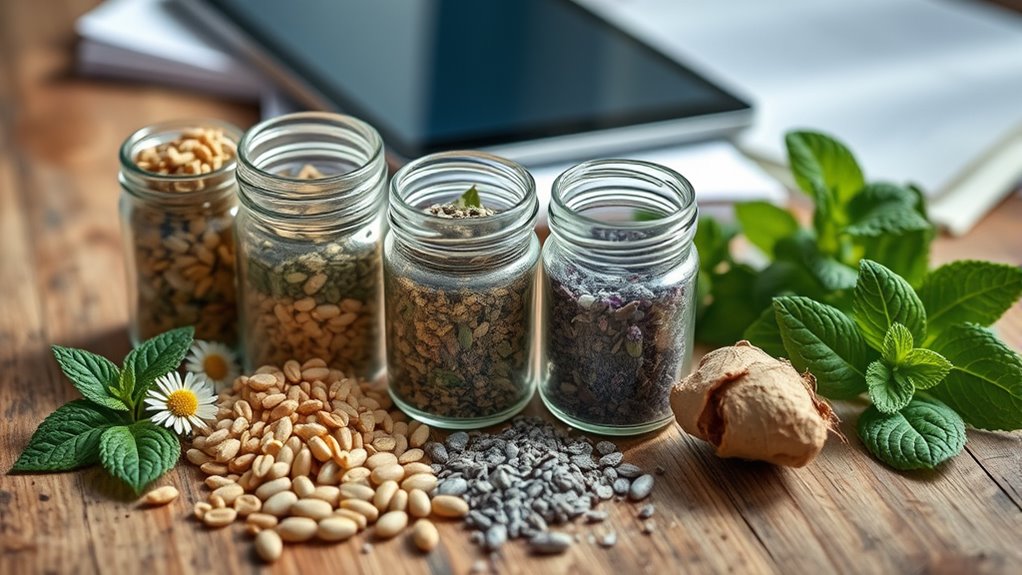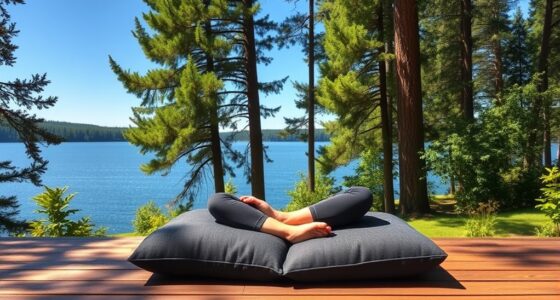Herbal supplements like valerian root, passionflower, lavender, chamomile, and ashwagandha may help reduce anxiety and promote relaxation based on traditional use and some scientific studies. While these herbs show promise in easing stress without harsh side effects, results vary and more research is needed to confirm their effectiveness. Be sure to choose reputable products and consult a healthcare professional before starting any new supplement—there’s more to uncover about their safety and proper use.
Key Takeaways
- Several herbs like valerian, passionflower, and lavender have shown potential in promoting relaxation and reducing anxiety symptoms.
- Clinical studies suggest valerian may improve sleep quality and decrease anxiety, though more rigorous research is needed.
- Herbal treatments are generally safe but can cause side effects and interact with medications, requiring professional consultation.
- Quality and potency vary among herbal supplements due to inconsistent regulation; choosing reputable brands is essential.
- Future research aims to standardize formulations, clarify mechanisms, and personalize herbal anxiety treatments for better efficacy.
Overview of Common Herbal Supplements Used for Anxiety
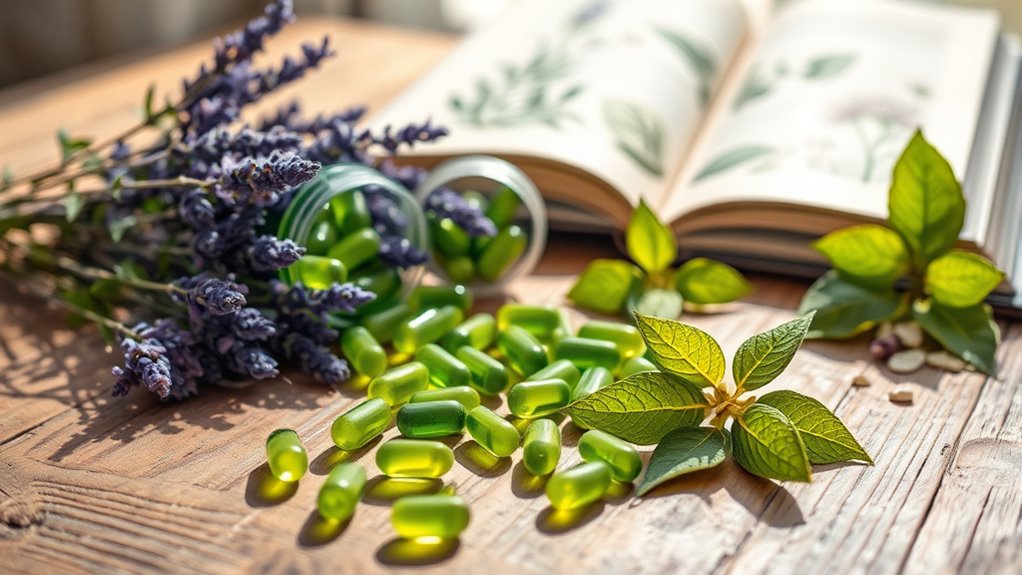
Have you ever wondered which herbal supplements can help ease anxiety? Several herbs are popular for their calming effects. Valerian root is known for promoting relaxation and improving sleep quality. Passionflower may reduce anxiety symptoms and calm your mind. Lavender, often used in essential oils, can lessen stress and promote a sense of calm. Chamomile is widely used in teas to soothe nerves and reduce tension. Ashwagandha, an adaptogen, helps your body manage stress more effectively. Lemon balm is another herb believed to ease anxiety and improve mood. These supplements are generally accessible and have been used traditionally for centuries. However, their effectiveness varies, and it’s important to understand their potential benefits and risks before trying them.
Scientific Evidence Supporting Herbal Remedies

Scientific studies have begun to shed light on how herbal remedies may help alleviate anxiety, though results often vary. Some research suggests that certain herbs, like valerian root, passionflower, and lavender, can promote relaxation and reduce anxiety symptoms. For example, clinical trials have shown that valerian may improve sleep quality and decrease anxiety levels, while lavender aromatherapy has demonstrated calming effects in some participants. Additionally, understanding the Ford Tuning process reveals that individual responses to herbal treatments can vary based on factors like genetics and overall health. However, the quality and size of these studies differ, and results are sometimes inconsistent. Many factors, such as dosage, preparation, and individual differences, influence outcomes. Overall, while some evidence supports the potential benefits of herbal treatments, more rigorous research is needed to confirm their effectiveness and establish standardized guidelines for safe use.
Potential Benefits and Risks of Herbal Anxiety Treatments
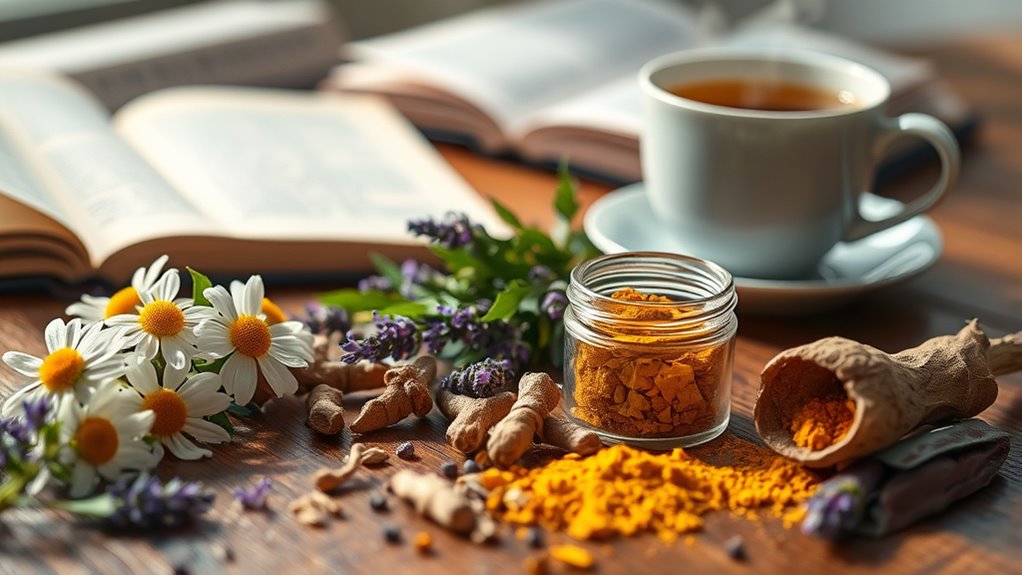
Herbal supplements for anxiety can offer notable benefits, such as promoting relaxation and reducing stress without the intense side effects often associated with pharmaceutical options. However, they also carry potential risks you should consider. For example, some herbs may cause nausea, dizziness, or allergic reactions, especially if taken in excess or combined with medications. Herbal supplements can interact with prescription drugs, diminishing effectiveness or causing unwanted effects. Additionally, the variability in projector image quality due to inconsistent regulation means the potency and purity of herbal products can differ significantly. While herbal remedies might help manage anxiety, it’s essential to weigh these benefits against potential risks and consult a healthcare professional before starting any new supplement.
Considerations for Choosing Herbal Supplements
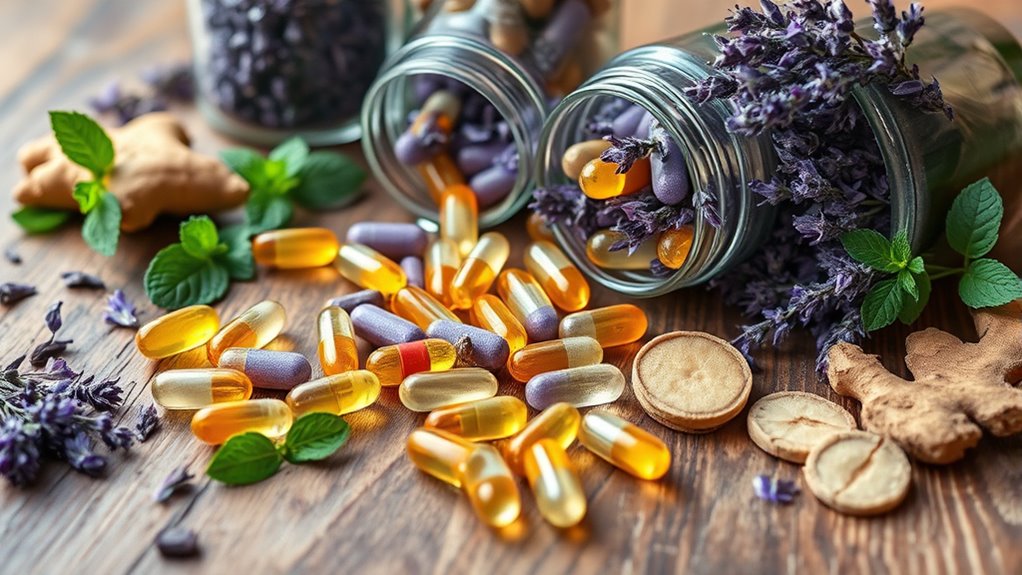
Choosing the right herbal supplement requires careful consideration of several factors to guarantee safety and effectiveness. First, check for quality and purity by selecting products from reputable brands. Consider potential interactions with medications you’re taking, and consult your healthcare provider before starting any new supplement. Pay attention to specific ingredients, as some herbs may cause allergies or adverse effects. Additionally, review scientific evidence supporting the supplement’s effectiveness for anxiety. According to Patchology.ORG, verifying the authenticity of brands and products can help ensure you are getting high-quality options.
Future Directions in Herbal Anxiety Research

As interest in herbal remedies for anxiety continues to grow, researchers are exploring innovative ways to improve their safety and effectiveness. You can expect future studies to focus on standardizing herbal formulations, ensuring consistent quality across products. Additionally, scientists are investigating the mechanisms behind herbal effects to better understand how they reduce anxiety symptoms. They’re also looking at personalized approaches, tailoring herbal treatments to individual genetic and health profiles for better outcomes. Moreover, advancing educational tools can help consumers make informed decisions about herbal supplement use.
Frequently Asked Questions
Are Herbal Supplements Safe for Long-Term Use?
You’re wondering if herbal supplements are safe for long-term use. While many believe they’re natural and harmless, safety depends on the herb, dosage, and individual health. Some supplements can cause side effects or interact with medications over time. It’s wise to consult your healthcare provider before using them long-term to ensure they’re appropriate for your personal health needs and to avoid potential risks.
Can Herbal Remedies Replace Prescription Medications for Anxiety?
You might wonder if herbal remedies can substitute prescription medications for anxiety. While some herbs may help reduce symptoms, they shouldn’t replace your doctor’s advice or prescribed treatments without consulting your healthcare provider. Herbs can complement your plan, but they often lack the extensive evidence and regulation that medications have. Always talk to a professional before making changes to your treatment to ensure safety and effectiveness.
How Do Herbal Supplements Interact With Other Medications?
Imagine your medications as a well-reheared orchestra. Herbal supplements are like new instruments joining in—sometimes they harmonize, but other times, they cause discord. You need to watch out for interactions, such as increased sedation or reduced effectiveness, because herbs like St. John’s Wort can affect how your medications work. Always talk to your healthcare provider before mixing herbal supplements with prescription drugs to keep your health in sync.
What Are the Signs of Adverse Reactions to Herbal Anxiety Treatments?
When taking herbal anxiety treatments, you should watch for signs of adverse reactions. These include allergic responses like rash, itching, or swelling, along with gastrointestinal issues such as nausea or diarrhea. You might also experience dizziness, headaches, or fatigue. If you notice any of these symptoms, stop using the supplement immediately and consult your healthcare provider. Staying alert helps make certain your safety while managing anxiety with herbal remedies.
Are There Specific Populations That Should Avoid Herbal Supplements?
Did you know that about 20% of people use herbal supplements for anxiety? If you’re pregnant, nursing, or taking medications, you should avoid certain herbs, as they might cause adverse effects or interact negatively. Children, older adults, and those with underlying health conditions should also be cautious. Always consult your healthcare provider before starting any herbal supplement to verify it’s safe for your specific situation.
Conclusion
If you’re considering herbal supplements for anxiety, remember that about 30% of adults use them to manage stress. While some remedies like lavender and passionflower show promise, always consult your healthcare provider first. Keep in mind that research is ongoing, and individual responses vary. By staying informed and cautious, you can make better choices for your mental health and find herbal options that genuinely support your well-being.
